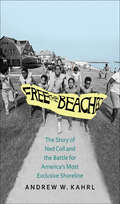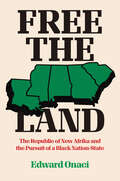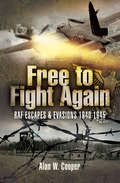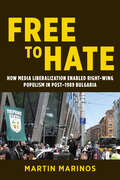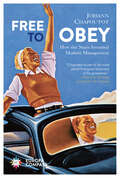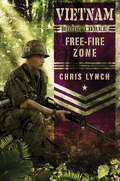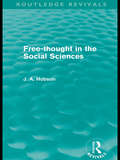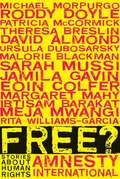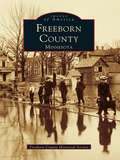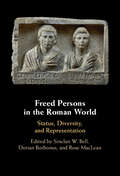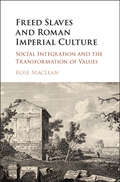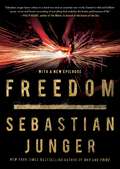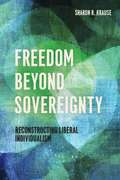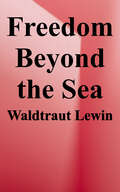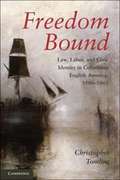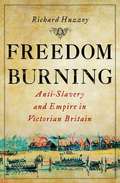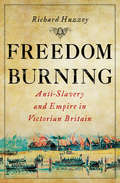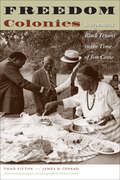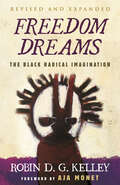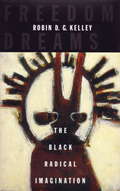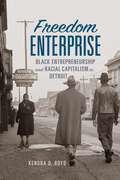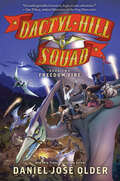- Table View
- List View
Free the Beaches: The Story of Ned Coll and the Battle for America's Most Exclusive Shoreline
by Andrew W. Kahrl“A well-documented—and dispiriting—history of prejudice and inequality . . . An unsparing exposé of white supremacy among Northern elites.” —Kirkus ReviewsDuring the long, hot summers of the late 1960s and 1970s, one man began a campaign to open some of America’s most exclusive beaches to minorities and the urban poor. That man was anti-poverty activist and one-time presidential candidate Ned Coll of Connecticut, a state that permitted public access to a mere seven miles of its 253-mile shoreline. Nearly all of the state’s coast was held privately, for the most part by white, wealthy residents.This book is the first to tell the story of the controversial protester who gathered a band of determined African American mothers and children and challenged the racist, exclusionary tactics of homeowners in a state synonymous with liberalism. Coll’s legacy of remarkable successes—and failures—illuminates how our nation’s fragile coasts have not only become more exclusive in subsequent decades but also have suffered greater environmental destruction and erosion as a result of that private ownership.Winner of the Homer D. Babbidge Award, sponsored by the Association for the Study of Connecticut HistoryWinner of the 2019 Connecticut Book Awards, non-fiction category, sponsored by Connecticut Center for the Book“This is a life story brimming with humanity and a great antidote to life under global capitalism, in which privatization is all the rage. Andrew Kahrl’s book is sure to have a sorely needed humanizing effect on all its readers.” —Ted Steinberg, award-winning author of Gotham Unbound: The Ecological History of Greater New York
Free the Land: The Republic of New Afrika and the Pursuit of a Black Nation-State (Justice, Power, and Politics)
by Edward OnaciOn March 31, 1968, over 500 Black nationalists convened in Detroit to begin the process of securing independence from the United States. Many concluded that Black Americans' best remaining hope for liberation was the creation of a sovereign nation-state, the Republic of New Afrika (RNA). New Afrikan citizens traced boundaries that encompassed a large portion of the South--including South Carolina, Georgia, Alabama, Mississippi, and Louisiana--as part of their demand for reparation. As champions of these goals, they framed their struggle as one that would allow the descendants of enslaved people to choose freely whether they should be citizens of the United States. New Afrikans also argued for financial restitution for the enslavement and subsequent inhumane treatment of Black Americans. The struggle to "Free the Land" remains active to this day. This book is the first to tell the full history of the RNA and the New Afrikan Independence Movement. Edward Onaci shows how New Afrikans remade their lifestyles and daily activities to create a self-consciously revolutionary culture, and argues that the RNA's tactics and ideology were essential to the evolution of Black political struggles. Onaci expands the story of Black Power politics, shedding new light on the long-term legacies of mid-century Black Nationalism.
Free to Fight Again: RAF Escapes and Evasions, 1940–1945
by Alan W. CooperTo survive baling out from a doomed aircraft or a crash-landing in enemy occupied territory certainly required a large element of luck. To then manage to return to Allied shores inevitably needed considerably more good fortune and often the assistance of local patriots and resistance workers. This book contains the amazing stories of over seventy such escapes, many first-hand accounts. It includes aircrew who found their way to freedom from Europe and places as far away as the Bay of Bengal. There are stories of hi-jacked aircraft, crossing crocodile infested swamps, evasion by camel and coffin, survival in the jungle and brushes with the Gestapo.
Free to Hate: How Media Liberalization Enabled Right-Wing Populism in Post-1989 Bulgaria (Geopolitics of Information)
by Martin MarinosLinking neoliberalism with the Right’s global rise Bulgaria’s media-driven pivot to right-wing populism parallels political developments taking place around the world. Martin Marinos applies a critical political economy approach to place Bulgarian right-wing populism within the structural transformation of the country’s media institutions. As Marinos shows, media concentration under Western giants like Westdeutsche Allgemeine Zeitung and News Corporation have led to a neoliberal turn of commercialization, concentration, and tabloidization across media. The Right have used the anticommunism and racism bred by this environment to not only undermine traditional media but position their own outlets to boost new political entities like the nationalist party Ataka. Marinos’s ethnographic observations and interviews with local journalists, politicians, and media experts add on-the-ground detail to his account. He also examines several related issues, including the performative appeal of populist media and the money behind it. A timely and innovative analysis, Free to Hate reveals where structural changes in media intersect with right-wing populism.
Free to Obey: How the Nazis Invented Modern Management
by Johann ChapoutotWhat if the rules of modern capitalism were written during the Third Reich? Reinhard Höhn (1904-2000) was a commander of the SS, one of Nazi Germany’s most brilliant legal minds, and an archetype of the fervid technocrats and intellectuals that built the Third Reich. Following Germany’s defeat, after a few years in hiding, he emerged in the early 1950s as the founder and director of a renowned management school in Lower Saxony. Höhn’s story wouldn’t be very different from that of many other prominent Nazis if not for the fact that a vast number of Germany’s postwar business leaders—more than 600,000 executives—were educated at his management school. In this fascinating book, Johann Chapoutot, one of France’s most brilliant historians, traces the profound links between Nazism and the principles of modern corporate management, our definitions of success, and a concept of personal freedom that masks rigid hierarchical structures of power and control. “One of the most gifted European historians of his generation.”—Timothy Snyder, New York Times best-selling author of On Tyranny
Free-Fire Zone: Free-Fire Zone (Vietnam #3)
by Chris LynchFour best friends. Four ways to serve their country.Morris, Rudi, Ivan, and Beck are best friends for life. So when one of the teens is drafted into the Vietnam War, the others sign up, too. Although they each serve in a different branch, they are fighting the war together -- and they promise to do all they can to come home together.Rudi is perhaps the most concerned about whether or not he'll be able to keep that promise. After all -- and he'd be the first to admit this -- he's not the most capable guy. He's not smart like Beck, or brave like Ivan. He lacks the strength of Morris's moral convictions.But once Rudi is pulled kicking and screaming into the Marines, he at last finds something he's good at: following orders. Will that be enough to keep him alive? And if he does survive the war, will his best friends even recognize him on the other side?
Free-Thought in the Social Sciences (Routledge Revivals)
by J. A. HobsonThis Routledge Revival sees the reissue of a seminal work by British economist, sociologist and academic John A. Hobson, elucidating his views on a variety of topics across the social sciences. He makes particular reference to the struggle between the disinterested urge of the social scientist and the interests and other motive forces which tend to influence and mould his processes of inquiry. The work is split into three parts, focussing upon free-thinking, economics and political ethics respectively.
Free? Stories About Human Rights
by Amnesty International StaffWhat does it mean to be free? Top authors donate their talents to explore the question in a compelling collection to benefit Amnesty International. An anthology of fourteen stories by young adult authors from around the world, on such themes as asylum, law, education, and faith.
Freeborn County, Minnesota
by Freeborn County Historical SocietyFreeborn County is home to pioneers from many different nations. Their common denominator was the rich farmland and the related businesses that promised a good life for their families. When Lt. Albert Miller Lea surveyed the area in 1835 with the Dragoons of Fort Des Moines, he described sparkling lakes encircled by gently sloping woodlands, smooth prairies interspersed with shady groves and rich with the melody of feathered songsters--one of the most beautiful lands ever witnessed.
Freed Persons in the Roman World: Status, Diversity, and Representation
by Dorian Borbonus Rose MacLean Sinclair W. BellHow were freed people represented in the Roman world? This volume presents new research about the integration of freed persons into Roman society. It addresses the challenge of studying Roman freed persons on the basis of highly fragmentary sources whose contents have been fundamentally shaped by the forces of domination. Even though freed persons were defined through a common legal status and shared the experience of enslavement and manumission, many different interactions could derive from these commonalities in different periods and localities across the empire. Drawing on literary, epigraphic, and archaeological evidence, this book provides cases studies that test the various ways in which juridical categories and normative discourses shaped the social and cultural landscape in which freed people lived. By approaching the literary and epigraphic representations of freed persons in new ways, it nuances the impact of power asymmetries and social strategies on the cultural practices and lived experiences of freed persons.
Freed Slaves and Roman Imperial Culture: Social Integration And The Transformation Of Values
by Rose MacLeanDuring the transition from Republic to Empire, the Roman aristocracy adapted traditional values to accommodate the advent of monarchy. <P><P>Freed Slaves and Roman Imperial Culture examines the ways in which members of the elite appropriated strategies from freed slaves to negotiate their relationship to the princeps and to redefine measures of individual progress. Primarily through the medium of inscribed burial monuments, Roman freedmen entered a broader conversation about power, honor, virtue, memory, and the nature of the human life course. Through this process, former slaves exerted a profound influence on the transformation of aristocratic values at a critical moment in Roman history.<P> Examines freed slaves' impact on Roman cultural history.<P> Identifies new factors in the transformation of elite values under the Principate.<P> Combines analysis of inscriptions with close readings of literary texts.
Freedom
by Sebastian JungerA profound rumination on the concept of freedom from the New York Times bestselling author of Tribe.Throughout history, humans have been driven by the quest for two cherished ideals: community and freedom. The two don&’t coexist easily. We value individuality and self-reliance, yet are utterly dependent on community for our most basic needs. In this intricately crafted and thought-provoking book, Sebastian Junger examines the tension that lies at the heart of what it means to be human. For much of a year, Junger and three friends—a conflict photographer and two Afghan War vets—walked the railroad lines of the East Coast. It was an experiment in personal autonomy, but also in interdependence. Dodging railroad cops, sleeping under bridges, cooking over fires, and drinking from creeks and rivers, the four men forged a unique reliance on one another. In Freedom, Junger weaves his account of this journey together with primatology and boxing strategy, the history of labor strikes and Apache raiders, the role of women in resistance movements, and the brutal reality of life on the Pennsylvania frontier. Written in exquisite, razor-sharp prose, the result is a powerful examination of the primary desire that defines us.
Freedom At Midnight: फ्रीडम ॲट मिडनाइट
by Larry Collins Dominique Lapierre“फ्रीडम ॲट मिडनाइट” हे पुस्तक भारताच्या स्वातंत्र्यसंग्रामाच्या शेवटच्या दिवसांचे आणि भारताच्या स्वातंत्र्य मिळविण्याच्या काळातील घटनांचे एक विस्तृत वर्णन आहे. हे पुस्तक 1947 सालच्या ऐतिहासिक घटनांचे, भारताची फाळणी, महात्मा गांधींची हत्या, आणि भारताचे पहिले पंतप्रधान पंडित जवाहरलाल नेहरू यांच्या कार्यांचे तपशीलवार वर्णन करते. लॉर्ड माउंटबॅटन यांची भारताच्या शेवटच्या व्हाईसरॉय म्हणून भूमिका देखील विस्तृतपणे मांडलेली आहे. डॉमिनिक लॉपिए आणि लॅरी कॉलिन्स यांनी अतिशय सखोल संशोधन करून आणि विविध साक्षात्कारांद्वारे हे पुस्तक लिहिले आहे, ज्यामुळे या काळातील घटनांचे जीवंत चित्रण उभे राहते. हे पुस्तक भारताच्या स्वातंत्र्याच्या इतिहासावरचे एक महत्त्वाचे साहित्य आहे, ज्यामध्ये अनेक न उलगडलेल्या गोष्टींचे वर्णन आहे. “फ्रीडम ॲट मिडनाइट” हे पुस्तक इतिहास प्रेमी, विद्यार्थी, आणि भारतीय स्वातंत्र्य चळवळीतील घटकांमध्ये रुची असलेल्या वाचकांसाठी एक अनिवार्य वाचन आहे.
Freedom Beyond Sovereignty: Reconstructing Liberal Individualism
by Sharon R. KrauseWhat does it mean to be free? We invoke the word frequently, yet the freedom of countless Americans is compromised by social inequalities that systematically undercut what they are able to do and to become. If we are to remedy these failures of freedom, we must move beyond the common assumption, prevalent in political theory and American public life, that individual agency is best conceived as a kind of personal sovereignty, or as self-determination or control over one’s actions. In Freedom Beyond Sovereignty, Sharon R. Krause shows that individual agency is best conceived as a non-sovereign experience because our ability to act and affect the world depends on how other people interpret and respond to what we do. The intersubjective character of agency makes it vulnerable to the effects of social inequality, but it is never in a strict sense socially determined. The agency of the oppressed sometimes surprises us with its vitality. Only by understanding the deep dynamics of agency as simultaneously non-sovereign and robust can we remediate the failed freedom of those on the losing end of persistent inequalities and grasp the scope of our own responsibility for social change. Freedom Beyond Sovereignty brings the experiences of the oppressed to the center of political theory and the study of freedom. It fundamentally reconstructs liberal individualism and enables us to see human action, personal responsibility, and the meaning of liberty in a totally new light.
Freedom Beyond the Sea
by Waldtraut LewinFleeing the Spanish Inquisition, a Jewish girl disguises herself and signs on as a ship’s boy, little knowing that she is headed for unknown waters with Christopher Columbus. <p><p> In Spain at the end of the 15th century, Jews are persecuted, robbed, expelled from their homes, and murdered. Esther, the daughter of the rabbi of Cordoba, flees from home dressed as a boy. She is the only one in her family who escapes the bloodhounds of the Inquisition. <p><p> Esther is lucky: Through craft and bribery, she manages to sign on as a ship’s boy to get out of the country. At last she thinks she is safe. But she soon finds out that her ship is on a dangerous journey, sailing west across the ocean into unknown waters, searching for a new route to India. Her captain’s name? Christopher Columbus — a man who proves to have a keen eye for deception. It seems only a question of time before he discovers Esther’s secret.
Freedom Bound: Law, Labor, and Civic Identity in Colonizing English America, 1580-1865
by Christopher TomlinsFreedom Bound is about the origins of modern America - a history of colonizing, work, and civic identity from the beginnings of English presence on the mainland until the Civil War. It is a history of migrants and migrations, of colonizers and colonized, of households and servitude and slavery, and of the freedom all craved and some found. Above all it is a history of the law that framed the entire process. Freedom Bound tells how colonies were planted in occupied territories, how they were populated with migrants - free and unfree - to do the work of colonizing, and how the newcomers secured possession. It tells of the new civic lives that seemed possible in new commonwealths, and of the constraints that kept many from enjoying them. It follows the story long past the end of the eighteenth century until the American Civil War, when - just for a moment - it seemed that freedom might finally be unbound.
Freedom Bound: Law, Labor, and Civic Identity in Colonizing English America, 1580–1865
by Christopher TomlinsFreedom Bound is about the origins of modern America - a history of colonizing, work and civic identity from the beginnings of English presence on the mainland until the Civil War. It is a history of migrants and migrations, of colonizers and colonized, of households and servitude and slavery, and of the freedom all craved and some found. Above all it is a history of the law that framed the entire process. Freedom Bound tells how colonies were planted in occupied territories, how they were populated with migrants - free and unfree - to do the work of colonizing and how the newcomers secured possession. It tells of the new civic lives that seemed possible in new commonwealths and of the constraints that kept many from enjoying them. It follows the story long past the end of the eighteenth century until the American Civil War, when - just for a moment - it seemed that freedom might finally be unbound.
Freedom Burning
by Richard HuzzeyAfter Britain abolished slavery throughout most of its empire in 1834, Victorians adopted a creed of "anti-slavery" as a vital part of their national identity and sense of moral superiority to other civilizations. The British government used diplomacy, pressure, and violence to suppress the slave trade, while the Royal Navy enforced abolition worldwide and an anxious public debated the true responsibilities of an anti-slavery nation. This crusade was far from altruistic or compassionate, but Richard Huzzey argues that it forged national debates and political culture long after the famous abolitionist campaigns of William Wilberforce and Thomas Clarkson had faded into memory. These anti-slavery passions shaped racist and imperialist prejudices, new forms of coerced labor, and the expansion of colonial possessions. In a sweeping narrative that spans the globe, Freedom Burning explores the intersection of philanthropic, imperial, and economic interests that underlay Britain's anti-slavery zeal- from London to Liberia, the Sudan to South Africa, Canada to the Caribbean, and the British East India Company to the Confederate States of America. Through careful attention to popular culture, official records, and private papers, Huzzey rewrites the history of the British Empire and a century-long effort to end the global trade in human lives.
Freedom Burning: Anti-Slavery and Empire in Victorian Britain
by Richard HuzzeyAfter Britain abolished slavery throughout most of its empire in 1834, Victorians adopted a creed of "anti-slavery" as a vital part of their national identity and sense of moral superiority to other civilizations. The British government used diplomacy, pressure, and violence to suppress the slave trade, while the Royal Navy enforced abolition worldwide and an anxious public debated the true responsibilities of an anti-slavery nation. This crusade was far from altruistic or compassionate, but Richard Huzzey argues that it forged national debates and political culture long after the famous abolitionist campaigns of William Wilberforce and Thomas Clarkson had faded into memory. These anti-slavery passions shaped racist and imperialist prejudices, new forms of coerced labor, and the expansion of colonial possessions.In a sweeping narrative that spans the globe, Freedom Burning explores the intersection of philanthropic, imperial, and economic interests that underlay Britain's anti-slavery zeal- from London to Liberia, the Sudan to South Africa, Canada to the Caribbean, and the British East India Company to the Confederate States of America. Through careful attention to popular culture, official records, and private papers, Huzzey rewrites the history of the British Empire and a century-long effort to end the global trade in human lives.
Freedom Colonies: Independent Black Texans in the Time of Jim Crow (Jack and Doris Smothers Series in Texas History, Life, and Culture)
by Thad Sitton James H. ConradA history of independent African American settlements in Texas during the Jim Crow era, featuring historical and contemporary photographs.In the decades following the Civil War, nearly a quarter of African Americans achieved a remarkable victory—they got their own land. While other ex-slaves and many poor whites became trapped in the exploitative sharecropping system, these independence-seeking individuals settled on pockets of unclaimed land that had been deemed too poor for farming and turned them into successful family farms. In these self-sufficient rural communities, often known as “freedom colonies,” African Americans created a refuge from the discrimination and violence that routinely limited the opportunities of blacks in the Jim Crow South.Freedom Colonies is the first book to tell the story of these independent African American settlements. Thad Sitton and James Conrad focus on communities in Texas, where blacks achieved a higher percentage of land ownership than in any other state of the Deep South. The authors draw on a vast reservoir of ex-slave narratives, oral histories, written memoirs, and public records to describe how the freedom colonies formed and to recreate the lifeways of African Americans who made their living by farming or in skilled trades such as milling and blacksmithing. They also uncover the forces that led to the decline of the communities from the 1930s onward, including economic hard times and the greed of whites who found legal and illegal means of taking black-owned land. And they visit some of the remaining communities to discover how their independent way of life endures into the twenty-first century.“Thad Sitton and James H. Conrad have made an important contribution to African American and southern history with their study of communities fashioned by freedmen in the years after emancipation.” —Journal of American History“This study is a thoughtful and important addition to an understanding of rural Texas and the nature of black settlements.” —Journal of Southern History
Freedom Colonies: Independent Black Texans in the Time of Jim Crow (Jack and Doris Smothers Series in Texas History, Life, and Culture)
by Thad SittonThis study is a thoughtful and important addition to an understanding of rural Texas and the nature of black settlements. -- Journal of Southern History "Thad Sitton and James H. Conrad have made an important contribution to African American and southern history with their study of communities fashioned by freedmen in the years after emancipation. " -- Journal of American History "This book is the first of its kind. . . . Blacks emerge as thinkers and actors on the stage; that is, they were not merely passive victims; rather, they made their own history by building their own communities and by becoming free farmers. " -- James Smallwood, Professor Emeritus of History, Oklahoma State University In the decades following the Civil War, nearly a quarter of African Americans achieved a remarkable victory-- they got their own land. While other ex-slaves and many poor whites became trapped in the exploitative sharecropping system, these independence-seeking individuals settled on pockets of unclaimed land that had been deemed too poor for farming and turned them into successful family farms. In these self-sufficient rural communities, often known as "freedom colonies," African Americans created a refuge from the discrimination and violence that routinely limited the opportunities of blacks in the Jim Crow South. Freedom Colonies is the first book to tell the story of these independent African American settlements. Thad Sitton and James Conrad focus on communities in Texas, where blacks achieved a higher percentage of land ownership than in any other state of the Deep South. The authors draw on a vast reservoir of ex-slave narratives, oral histories, written memoirs, and publicrecords to describe how the freedom colonies formed and to recreate the lifeways of African Americans who made their living by farming or in skilled trades such as milling and blacksmithing. They also uncover the forces that led to the decline of the communities from the 1930s onward, including economic hard times and the greed of whites who found legal and illegal means of taking black-owned land. And they visit some of the remaining communities to discover how their independent way of life endures into the twenty-first century.
Freedom Dreams (TWENTIETH ANNIVERSARY EDITION): The Black Radical Imagination
by Robin D. KelleyThe 20th-anniversary edition of Kelley&’s influential history of 20th-century Black radicalism, with new reflections on current movements and their impact on the author, and a foreword by poet Aja MonetFirst published in 2002, Freedom Dreams is a staple in the study of the Black radical tradition. Unearthing the thrilling history of grassroots movements and renegade intellectuals and artists, Kelley recovers the dreams of the future worlds Black radicals struggled to achieve.Focusing on the insights of activists, from the Revolutionary Action Movement to the insurgent poetics of Aimé and Suzanne Césaire, Kelley chronicles the quest for a homeland, the hope that communism offered, the politics of surrealism, the transformative potential of Black feminism, and the long dream of reparations for slavery and Jim Crow.In this edition, Kelley includes a new introduction reflecting on how movements of the past 20 years have expanded his own vision of freedom to include mutual care, disability justice, abolition, and decolonization, and a new epilogue exploring the visionary organizing of today&’s freedom dreamers.This classic history of the power of the Black radical imagination is as timely as when it was first published.
Freedom Dreams: The Black Radical Imagination
by Robin D.G. KelleyKelley unearths freedom dreams in this exciting history of renegade intellectuals and artists of the African diaspora in the twentieth century. Focusing on the visions of activists from C. L. R. James to Aime Cesaire and Malcolm X, Kelley writes of the hope that Communism offered, the mindscapes of Surrealism, the transformative potential of radical feminism, and of the four-hundred-year-old dream of reparations for slavery and Jim Crow. From'the preeminent historian of black popular culture' (Cornel West), an inspiring work on the power of imagination to transform society.From the Trade Paperback edition.
Freedom Enterprise: Black Entrepreneurship and Racial Capitalism in Detroit (American Business, Politics, and Society)
by Kendra D. BoydTraces the rise and fall of the historic Black business community in DetroitThe Great Migration saw more than six million African Americans leave the US South between 1910 and 1970. Though the experiences of migrant laborers are well-known, countless African Americans also left the South to pursue entrepreneurial opportunities and viewed business as key to Black liberation. Detroit’s status as a mecca for Black entrepreneurship illuminates this overlooked aspect of the Great Migration story. In Freedom Enterprise, Kendra D. Boyd uses “migrant entrepreneurship” as a lens through which to understand the entwined histories of Black-owned business, racial capitalism, and urban space.Freedom Enterprise follows Black Southerners’ journeys to Detroit during the initial wave of migration in the 1910s and 1920s, through their efforts to build a prosperous Black business community in the 1930s and 1940s, to the destruction of that community through urban renewal projects and freeway construction in the 1950s and 1960s. Combining business and social history methods to analyze an eclectic archive, Boyd chronicles migrant entrepreneurs’ experiences, highlighting tales of racial and economic violence, Black women’s business organizing, illegal business, communist entrepreneurs, and cooperative economics.Boyd uses the framework of racial capitalism to examine migrant entrepreneurs’ experiences in twentieth-century America. In the Jim Crow South, African Americans worried about white mobs taking away their property, wealth, and lives. Though they sought refuge in Detroit, migrant entrepreneurs subsequently faced the loss of their livelihoods and the businesses they had spent decades building to the bulldozers of state-sponsored urban redevelopment initiatives. Southern migrants’ “freedom enterprise”—their undertaking of attaining freedom through business—was curtailed by the reality of operating within the confines of US racial capitalism.In tracing Black entrepreneurs across the Great Migration, Freedom Enterprise provides important insights into African Americans’ activism for racial and economic justice and continued racialized wealth disparities.
Freedom Fire (Dactyl Hill Squad #2)
by Daniel José Older"An unforgettable historical, high-octane adventure." -- Dav Pilkey, author-illustrator of the Dog Man seriesMagdalys and the squad are flying south on pteroback. South to rescue her older brother. South to war.The squad links up with the dino-mounted troops of the Louisiana Native Guard, an all-black regiment in the Union Army fighting to free their people. They're led by General Sheridan, surrounded by enemy forces in Tennessee and desperate for any edge to sway the tide of battle. Magdalys's burgeoning powers might be the Union's last hope. But she doesn't want to abandon the search for her brother. And she might not be the only one with a mysterious connection to dinosaurs.With the Civil War raging around her and the Union on the brink of collapse, how can Magdalys choose between the army that needs her help to survive and the brother she risked everything to save?
